Shifting Sands… a Startling Evolution
September – October 2020

A DUAL VENUE EXHIBITION
VENUE 1 DUBLIN: Associated Rewinds, Tallaght Business Park, Dublin D24 E932
An exhibition of new works will be opened by Éanna Ní Lamhna, Biologist, Environmentalist and Broadcaster 12th September 2020 at 3pm. Continues at the Dublin venue from 15th Sept to 26th September, 11am – 4pm Tuesday – Saturday
VENUE 2 KILCOCK: Kilcock Art Gallery, School Street, Kilcock, Co Kildare, W23 E5R5
The exhibition continues from October 1st to 31st 11am – 4pm Wednesdays to Saturdays
This new work explores the North Bull Island’s different habitats and follows the life of mud flats, salt marshes and dunes throughout the seasons. The North Bull Island, delivered by human intervention and reclaimed by nature: The island has developed from its embryonic beginnings 200 years ago to become a biosphere of important habitats, and a unique treasure of plants and wildlife within our capital city of Dublin.
Further details:
Kilcock Art Gallery +353 1 6287619 / +353 862578283 Email:info@webninja5.xyz
Artists Statement
“Shifting Sands … a Startling Evolution”
The North Bull Island is a sand spit in Dublin Bay, five kilometres long and 800 metres wide … and growing. Its beginnings can be traced back to human intervention when works were carried out to prevent silting of the harbour. Nature claimed its stake on the island, and from its embryonic beginnings 200 years ago, it has gradually developed into an important biosphere of habitats within our capital city.
Bull Island is a unique treasure for plants, animals, birds, and insects. The island hosts many migratory birds who winter here from as far north as the arctic circle. Others arrive in early Summer from warmer climates. I have walked the island, exploring these different habitats through Spring, Summer, Autumn and Winter, following the life of mud flats, dune complexes, saltwater marshes, freshwater marshes, and grassland dunes.
I have observed the resilient plants of the mud flats that are washed twice daily with salt water, the sturdy plants of the salt marshes that provide roosting sites for the many bird species.
The beauty of the grassland dunes in summertime, and the delicate orchids of the freshwater marshes nestling in the dips between dunes that trap rainwater and allow these special plants to thrive.
I have walked the island at low tide in winter and observed many bird species, collecting feathers of Brent Geese, Curlew, and others.
Exploring the long sandy beach, I have seen a variety of seaweeds washed in on the tide.
Dublin Bay has been designated as a Biosphere Reserve by UNESCO, and the North Bull Island has many more designations – more than any other site in Ireland.
The island is truly unique, and we should do everything in our power to conserve this special place.

BULL ISLAND TANGLE
The mysterious world that lies beneath the waves, swaying, pulsating fronds of Kelp and Bladderwrack
- Dimensions: 91.5 x 183.5 cm (36 x 72.2 inches)
- Medium: Acrylic on aluminium

END OF THE DAY, GRASSLAND DUNES
At this time of year the grassland dunes of the North Bull Island are a riot of colour
- Dimensions: 70 x 114 cm
- Medium: Acrylic on paper

BULL ISLAND TANGLE II
Kelp and Bladderwrack glisten in the light penetrating from the water’s surface.
- Dimensions: 60 x 60 cm (23.6 x 23.6 inches)
- Medium: Acrylic on aluminium

GRASSLAND DUNE COLONISER
Often seen on railway banks, Valerian, a brilliant opportunist has colonised parts of the grassland dunes.
- Dimensions: 60 x 60 cm (23.6 x 23.6 inches)
- Medium: Acrylic on aluminium

LATE SUMMER ON THE GRASSLAND DUNES
Knapweed can be found on the grassland dunes, often with foraging bumble bees.
- Dimensions: 60 x 60 cm (23.6 x 23.6 inches)
- Medium: Acrylic on aluminium

CAUSEWAY PATH
Umbellifers line the footpaths along the causeway, displaying their white disc-shaped flower heads.
- Dimensions: 70 x 50 cm (27.6 x 19.7 inches)
- Medium: Acrylic on aluminium

DUNELANDS
Spiky tufts of Marram Grass stabilise the sand dunes, allowing them to grow and expand.
- Dimensions: 70 x 50 cm (27.6 x 19.7 inches)
- Medium: Acrylic on aluminium

HIGH SUMMER ON THE GRASSLAND DUNES
A riot of colour can be seen during the summer months – Purple Toadflax, Giant Willowherb and Cat’s Ear all competing for pollinators’ attention.
- Dimensions: 70 x 50 cm (27.6 x 19.7 inches)
- Medium: Acrylic on aluminium

LABYRINTH
Elongated strands of Thong-weed whirling in the ebbing tide.
- Dimensions: 50 x 70 cm (19.7 x 27.6 inches)
- Medium: Acrylic on aluminium

SWIRL
Anchored Thong-weed and Bladder Wrack shimmer under the surface
- Dimensions: 70 x 50 cm (27.6 x 19.7 inches)
- Medium: Acrylic on aluminium

CAUSEWAY PATH
Yarrow and Purple Toadflax line the path along the causeway in the evening sun, both important plants for bees, butterflies and other insects.
- Dimensions: 50 x 50 cm (19.7 x 19.7 inches)
- Medium: Acrylic on aluminium

MALLOW
An opportunist, Mallow has colonised areas of the grassland dunes, and is a magnet for bees.
- Dimensions: 50 x 50 cm (19.7 x 19.7 inches)
- Medium: Acrylic on aluminium

CORNUCOPIA
On the borders of grassland dunes and sand dunes, hardy Ragwort and Wild Carrot abound.
- Dimensions: 50 x 40 cm (19.7 x 15.7 inches)
- Medium: Acrylic on aluminium

FOLLOW THE WINTER SUN
In the depths of January, fragrant Winter Heliotrope flowers. Although somewhat invasive, this clever plant follows the weak winter sun from the East in the morning to the West in the evening, getting the most from the light, and supporting early emerging pollinators.
- Dimensions: 35 x 50 cm (13.8 x 19.7 inches)
- Medium: Acrylic on aluminium

HIDDEN DIP, FRESHWATER MARSH
The Freshwater marshes of Bull Island are formed among dunes in dips where rainwater gathers. A surprising variety of plants can be found, plants you might see in a wildflower meadow, from rare orchids to Water Mint. This painting describes Self Heal, Silverweed and Water Mint.
- Dimensions: 40 x 30 cm (15.7 x 11.8 inches)
- Medium: Acrylic on aluminium
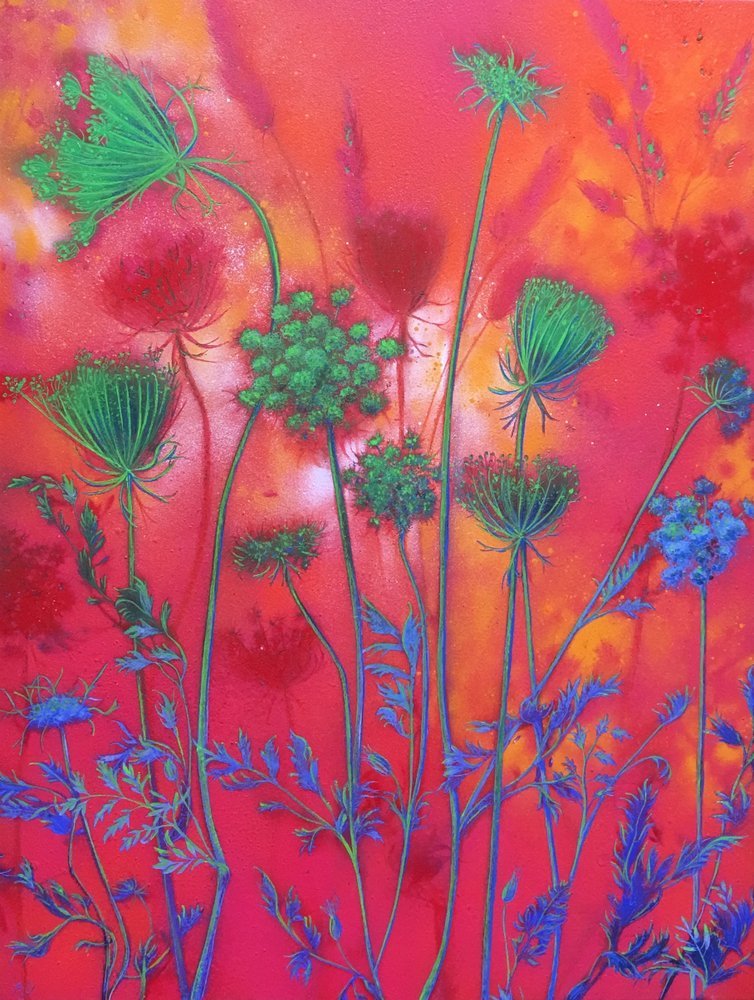
QUEEN ANNE’S LACE II
Wild Carrot also known as Queen Anne’s Lace because of its feathery leaves and delicate bracts. It grows on the grassland dunes and on the edges of the sand dunes.
- Dimensions: 40 x 30 cm (15.7 x 11.8 inches)
- Medium: Acrylic on aluminium

SALT MARSH PINKS II
Sea Pink or Thrift grows along the edges of the salt marshes, putting down a spongy carpet, and helping to form this important habitat for birds.
- Dimensions: 30 x 39 cm (11.8 x 15.4 inches)
- Medium: Acrylic on aluminium

SELF HEAL
This plant can be found in the freshwater marshes of Bull Island, where dips in the dunes have allowed rainwater to accumulate and form this habitat.
- Dimensions: 40 x 30 cm (15.7 x 11.8 inches)
- Medium: Acrylic on aluminium

SUBMERGED JUNGLE
An underwater jungle, Bladder Wrack swirls and sways under the water’s surface.
- Dimensions: 28 x 40 cm (11 x 15.7 inches)
- Medium: Acrylic on aluminium

LADY’S BEDSTRAW
Found on the grassland dunes, this plant was used in the to fill mattresses in years gone by.
- Dimensions: 30 x 30 cm (11.8 x 11.8 inches)
- Medium: Acrylic on aluminium

SALT MARSH COLONISERS
This painting describes some of the plants that are seminal in formation of Salt Marshes – Sea Aster, Sea Plantain and Glasswort.
- Dimensions: 30 x 30 cm (11.8 x 11.8 inches)
- Medium: Acrylic on aluminium
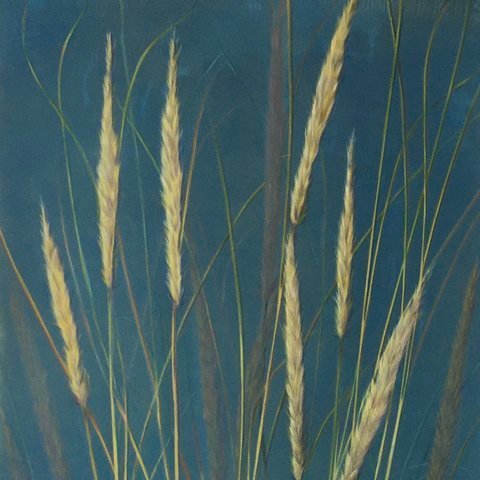
WINDBREAKER
Spiky tufts of Marram Grass stabilise the sand dunes, allowing them to grow, and for other species to colonise them.
- Dimensions: 71 x 34 cm (28 x 13.4 inches)
- Medium: Acrylic on aluminium

FIELD BINDWEED
This pretty plant can be seen sprawling over the grassland around the roundabout at the bottom of the causeway.
- Dimensions: 31 x 71 cm (12.2 x 28 inches)
- Medium: Acrylic on paper

RED CLOVER
Red Clover belongs to the pea family. It takes nitrogen from the air and fixes it into the soil, benefiting other plants.
- Dimensions: 35 x 35 cm (13.8 x 13.8 inches)
- Medium: Acrylic on paper

QUEEN ANNE’S LACE I
Wild Carrot also known as Queen Anne’s Lace because of its feathery leaves and delicate bracts. It grows on the grassland dunes and on the edges of the sand dunes.
- Dimensions: 31.5 x 28 cm (12.4 x 11 inches)
- Medium: Mixed media on paper

SALT MARSH PINKS I
Sea Pinks or Thrift grow along the edges of salt marshes, putting down a spongy carpet, and helping to form this important habitat.
- Dimensions: 34 x 34.5 cm (13.4 x 13.6 inches)
- Medium: Acrylic on paper

ANCHORS OF THE SALT MARSH
This painting describes plants that are seminal in the formation of salt marshes. They tolerate being washed with salt water, and by trapping sediment, creating an important habitat for migrating birds.
- Dimensions: 28 x 31.5 cm (11 x 12.4 inches)
- Medium: Acrylic on paper

HARE’S FOOT CLOVER I
This delicate downy flower, a member of the pea family, fixes nitrogen into the soil, allowing other species to thrive.
- Dimensions: 27 x 23 cm (10.6 x 9.1 inches)
- Medium: Mixed media on paper

SEA CAMPION
The contrast between the delicate white petals and the beautiful red/brown marking of its sepal, this plant is rare on the island.
- Dimensions: 24 x 18 cm (9.4 x 7.1 inches)
- Medium: Acrylic on paper

SAND PANSIES
These tiny pansies can be found in the fresh water marshes and borders of the dunes.
- Dimensions: 14 x 23 cm (5.5 x 9.1 inches)
- Medium: Acrylic on paper

HARE’S FOOT CLOVER II
These delicate downy flowers are a member of the pea family. They fix nitrogen into the soil, making it possible for other species to grow and thrive.
- Dimensions: 18 x 18 cm (7.1 x 7.1 inches)
- Medium: Acrylic on paper

HARE’S FOOT CLOVER III
These delicate downy flowers are a member of the pea family. They fix nitrogen into the soil, making it possible for other species to grow and thrive.
- Dimensions: 18 x 18 cm (7.1 x 7.1 inches)
- Medium: Acrylic on paper

PYRAMIDAL ORCHIDS I
The fresh water marshes abound with orchids throughout the summer. These plants rely not only on the right soil, but need to join forces with a fungus to grow. They often wait many years to emerge and flower.
- Dimensions: 38 x 24.5 cm (15 x 9.6 inches)
- Medium: Paper

PYRAMIDAL ORCHIDS II
The fresh water marshes abound with orchids throughout the summer. These plants rely not only on the right soil, but need to join forces with a fungus to grow. They often wait many years to emerge and flower.
- Dimensions: 38 x 24.5 cm (15 x 9.6 inches)
- Medium: Paper

PYRAMIDAL ORCHIDS III
The fresh water marshes abound with orchids throughout the summer. These plants rely not only on the right soil, but need to join forces with a fungus to grow. They often wait many years to emerge and flower.
- Dimensions: 38 x 24.5 cm (15 x 9.6 inches)
- Medium: Paper

PYRAMIDAL ORCHIDS IV
The fresh water marshes abound with orchids throughout the summer. These plants rely not only on the right soil, but need to join forces with a fungus to grow. They often wait many years to emerge and flower.
- Dimensions: 38 x 24.5 cm (15 x 9.6 inches)
- Medium: Paper

BRENT GOOSE FEATHERS
The delicate breast feathers of the Brent Goose – a migratory bird that winters in Ireland. Found on my winter wanderings around the island.
- Dimensions: 14 x 14 cm (5.5 x 5.5 inches)
- Medium: Mixed media on mount board

ISLAND ELEMENTS I
The delicate breast feathers of the Brent Goose – a migratory bird that winters in Ireland. Found on my winter wanderings around the island.
- Dimensions: 13.5 x 14.5 cm (5.3 x 5.7 inches)
- Medium: Mixed media on mount board

ISLAND ELEMENTS II
The delicate breast feathers of the Brent Goose – a migratory bird that winters in Ireland. Found on my winter wanderings around the island.
- Dimensions: 13.5 x 14.5 cm (5.3 x 5.7 inches)
- Medium: Mixed media on mount board
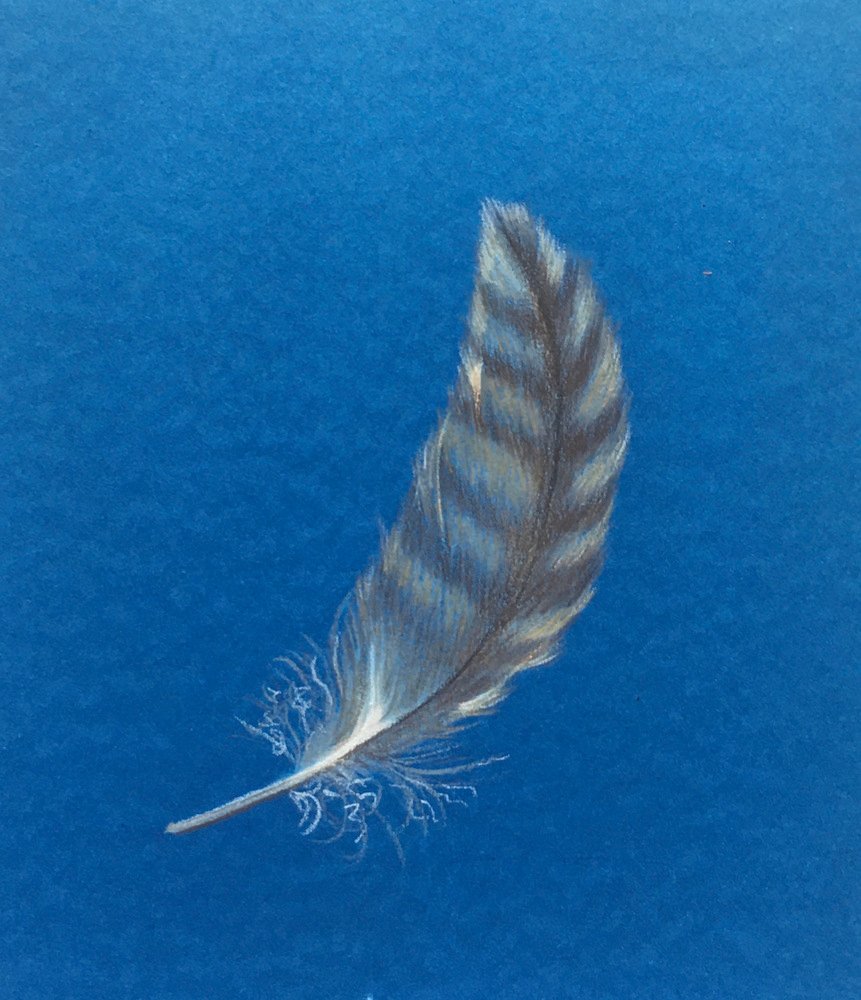
ISLAND ELEMENTS III
The delicate breast feathers of the Brent Goose – a migratory bird that winters in Ireland. Found on my winter wanderings around the island.
- Dimensions: 13.5 x 14.5 cm (5.3 x 5.7 inches)
- Medium: Mixed media on mount board

ISLAND ELEMENTS IV
The delicate breast feathers of the Brent Goose – a migratory bird that winters in Ireland. Found on my winter wanderings around the island.
- Dimensions: 13.5 x 14.5 cm (5.3 x 5.7 inches)
- Medium: Mixed media on mount board

ISLAND ELEMENTS V
The delicate breast feathers of the Brent Goose – a migratory bird that winters in Ireland. Found on my winter wanderings around the island.
- Dimensions: 13.5 x 14.5 cm (5.3 x 5.7 inches)
- Medium: Mixed media on mount board
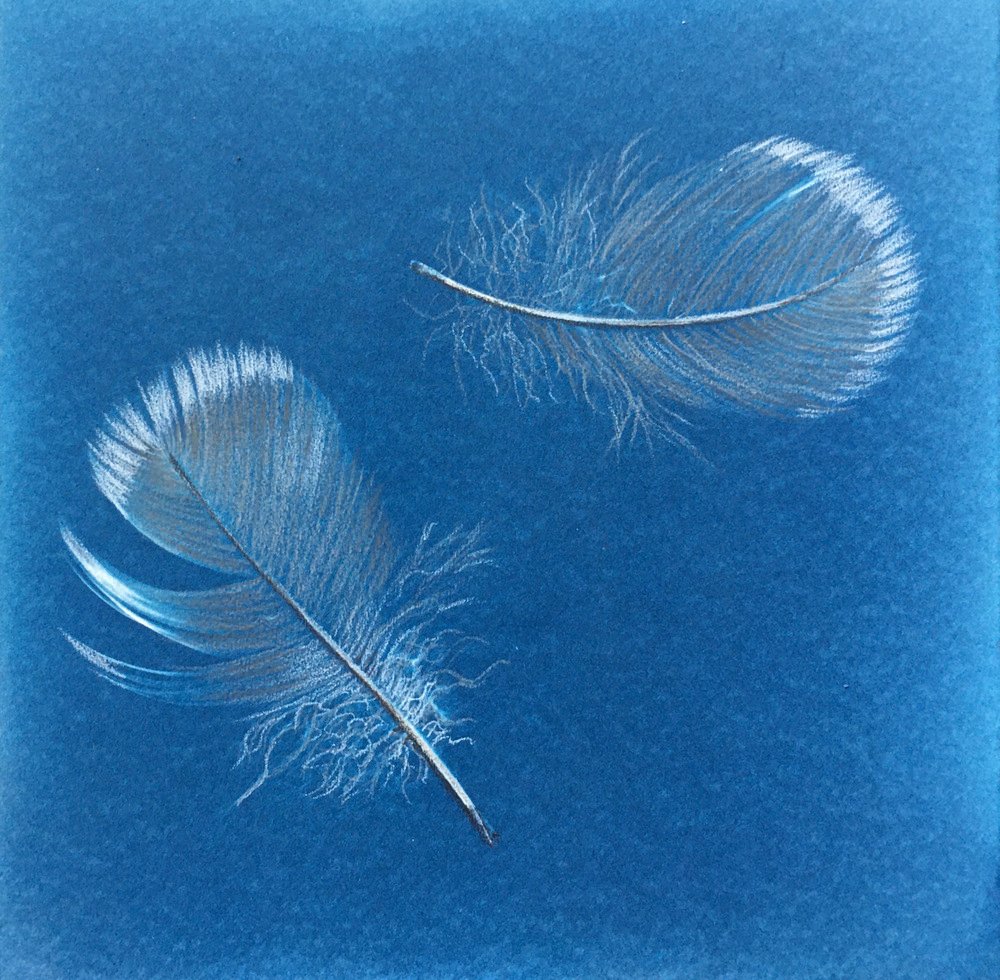
ISLAND ELEMENTS VI
The delicate breast feathers of the Brent Goose – a migratory bird that winters in Ireland. Found on my winter wanderings around the island.
- Dimensions: 13.5 x 14.5 cm (5.3 x 5.7 inches)
- Medium: Mixed media on mount board
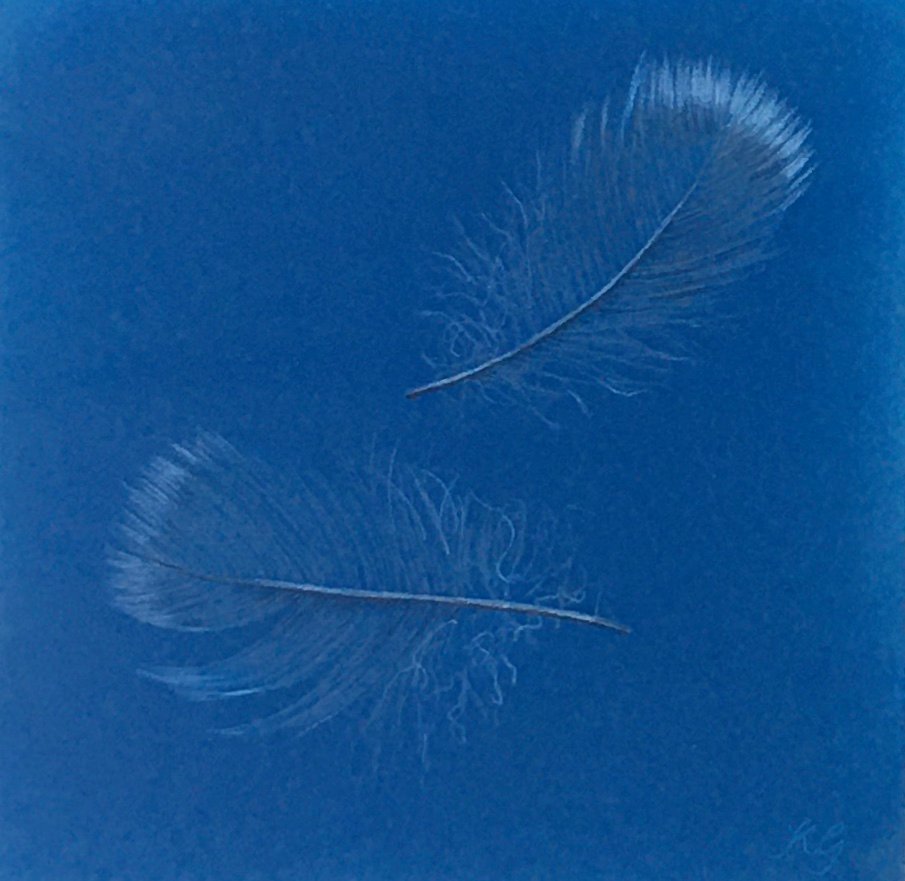
ISLAND ELEMENTS VII
The delicate breast feathers of the Brent Goose – a migratory bird that winters in Ireland. Found on my winter wanderings around the island.
- Dimensions: 13.5 x 14.5 cm (5.3 x 5.7 inches)
- Medium: Mixed media on mount board
